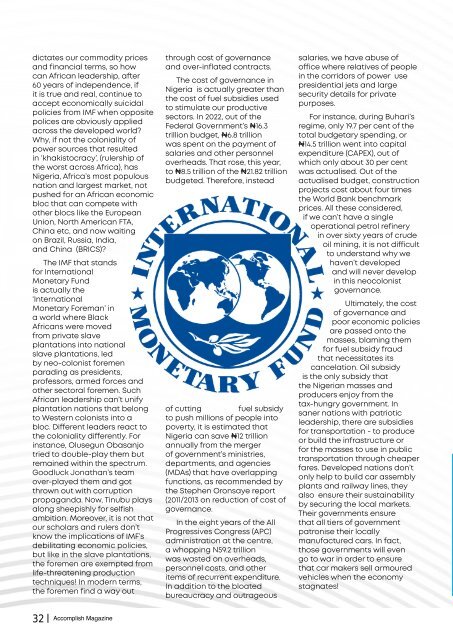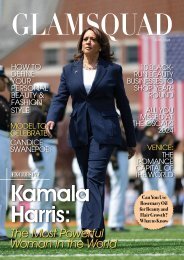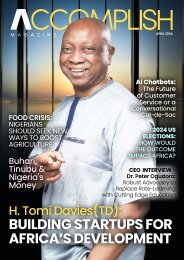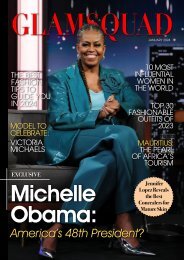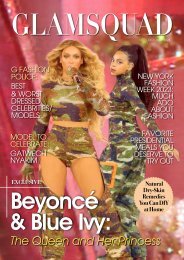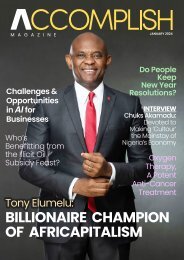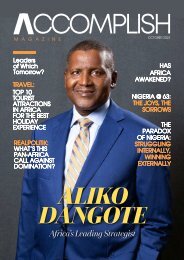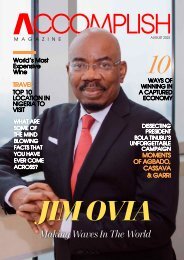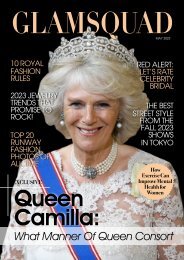ACCOMPLISH MAGAZINE NOV 2023
Mo Ibrahim: On Ethical Leadership In Africa
Mo Ibrahim: On Ethical Leadership In Africa
You also want an ePaper? Increase the reach of your titles
YUMPU automatically turns print PDFs into web optimized ePapers that Google loves.
dictates our commodity prices<br />
and financial terms, so how<br />
can African leadership, after<br />
60 years of independence, if<br />
it is true and real, continue to<br />
accept economically suicidal<br />
policies from IMF when opposite<br />
polices are obviously applied<br />
across the developed world?<br />
Why, if not the coloniality of<br />
power sources that resulted<br />
in ‘khakistocracy’, (rulership of<br />
the worst across Africa), has<br />
Nigeria, Africa’s most populous<br />
nation and largest market, not<br />
pushed for an African economic<br />
bloc that can compete with<br />
other blocs like the European<br />
Union, North American FTA,<br />
China etc, and now waiting<br />
on Brazil, Russia, India,<br />
and China (BRICS)?<br />
The IMF that stands<br />
for International<br />
Monetary Fund<br />
is actually the<br />
‘International<br />
Monetary Foreman’ in<br />
a world where Black<br />
Africans were moved<br />
from private slave<br />
plantations into national<br />
slave plantations, led<br />
by neo-colonist foremen<br />
parading as presidents,<br />
professors, armed forces and<br />
other sectoral foremen. Such<br />
African leadership can’t unify<br />
plantation nations that belong<br />
to Western colonists into a<br />
bloc. Different leaders react to<br />
the coloniality differently. For<br />
instance, Olusegun Obasanjo<br />
tried to double-play them but<br />
remained within the spectrum.<br />
Goodluck Jonathan’s team<br />
over-played them and got<br />
thrown out with corruption<br />
propaganda. Now, Tinubu plays<br />
along sheepishly for selfish<br />
ambition. Moreover, it is not that<br />
our scholars and rulers don’t<br />
know the implications of IMF’s<br />
debilitating economic policies,<br />
but like in the slave plantations,<br />
the foremen are exempted from<br />
life-threatening production<br />
techniques! In modern terms,<br />
the foremen find a way out<br />
through cost of governance<br />
and over-inflated contracts.<br />
The cost of governance in<br />
Nigeria is actually greater than<br />
the cost of fuel subsidies used<br />
to stimulate our productive<br />
sectors. In 2022, out of the<br />
Federal Government’s ₦16.3<br />
trillion budget, ₦6.8 trillion<br />
was spent on the payment of<br />
salaries and other personnel<br />
overheads. That rose, this year,<br />
to ₦8.5 trillion of the ₦21.82 trillion<br />
budgeted. Therefore, instead<br />
of cutting fuel subsidy<br />
to push millions of people into<br />
poverty, it is estimated that<br />
Nigeria can save ₦12 trillion<br />
annually from the merger<br />
of government’s ministries,<br />
departments, and agencies<br />
(MDAs) that have overlapping<br />
functions, as recommended by<br />
the Stephen Oronsaye report<br />
(2011/2013 on reduction of cost of<br />
governance.<br />
In the eight years of the All<br />
Progressives Congress (APC)<br />
administration at the centre,<br />
a whopping N59.2 trillion<br />
was wasted on overheads,<br />
personnel costs, and other<br />
items of recurrent expenditure.<br />
In addition to the bloated<br />
bureaucracy and outrageous<br />
salaries, we have abuse of<br />
office where relatives of people<br />
in the corridors of power use<br />
presidential jets and large<br />
security details for private<br />
purposes.<br />
For instance, during Buhari’s<br />
regime, only 19.7 per cent of the<br />
total budgetary spending, or<br />
₦14.5 trillion went into capital<br />
expenditure (CAPEX), out of<br />
which only about 30 per cent<br />
was actualised. Out of the<br />
actualised budget, construction<br />
projects cost about four times<br />
the World Bank benchmark<br />
prices. All these considered,<br />
if we can’t have a single<br />
operational petrol refinery<br />
in over sixty years of crude<br />
oil mining, it is not difficult<br />
to understand why we<br />
haven’t developed<br />
and will never develop<br />
in this neocolonist<br />
governance.<br />
Ultimately, the cost<br />
of governance and<br />
poor economic policies<br />
are passed onto the<br />
masses, blaming them<br />
for fuel subsidy fraud<br />
that necessitates its<br />
cancelation. Oil subsidy<br />
is the only subsidy that<br />
the Nigerian masses and<br />
producers enjoy from the<br />
tax-hungry government. In<br />
saner nations with patriotic<br />
leadership, there are subsidies<br />
for transportation - to produce<br />
or build the infrastructure or<br />
for the masses to use in public<br />
transportation through cheaper<br />
fares. Developed nations don’t<br />
only help to build car assembly<br />
plants and railway lines, they<br />
also ensure their sustainability<br />
by securing the local markets.<br />
Their governments ensure<br />
that all tiers of government<br />
patronise their locally<br />
manufactured cars. In fact,<br />
those governments will even<br />
go to war in order to ensure<br />
that car makers sell armoured<br />
vehicles when the economy<br />
stagnates!<br />
32<br />
Accomplish Magazine


